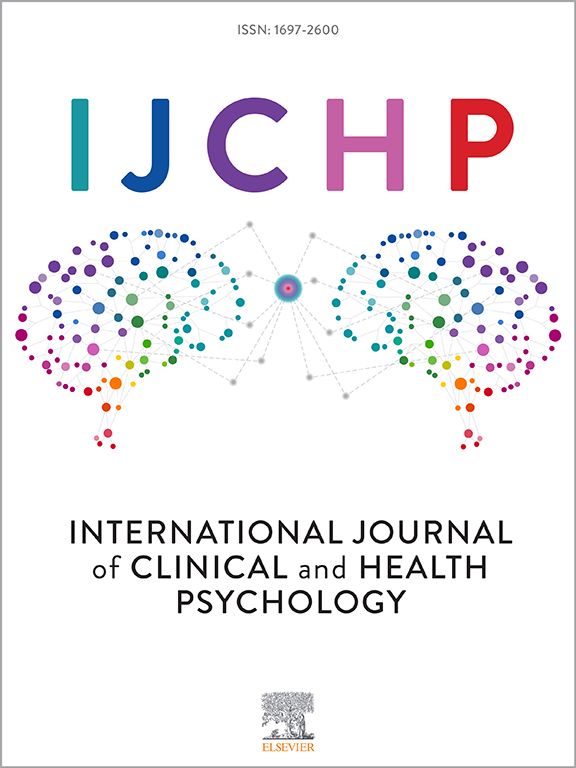Dancing Queen… Only seventy! the short- and long-term effects of older-women group dancing on self-esteem, depression, and self-judgment
IF 4.4
1区 心理学
Q1 PSYCHOLOGY, CLINICAL
International Journal of Clinical and Health Psychology
Pub Date : 2025-07-01
DOI:10.1016/j.ijchp.2025.100604
引用次数: 0
Abstract
This research examined the short-term and long-term effects of group dancing on self-esteem, depression, and self-judgment in older women participating in the GILA Methodology, a movement and performance art initiative specifically designed for mature women, developed by Galit Liss. The study, conducted from 2019 to 2023, involved 152 participants (mean age 69.98 ± 5.68) who participated in one to five measurements and were categorized as either Experienced (having participated for more than ten months and performed a solo dance) or Beginner dancers. Self-reported measures of depressive symptoms, self-judgment, and self-esteem were collected. This study found that Experienced dancers showed higher self-esteem and lower self-judgment than Beginners, with no difference in depression levels (n = 152). Over two years, depression levels decreased significantly overall (n = 23). This decrease in depression was primarily observed in Experienced dancers. The depression levels of beginner dancers did not change. Over two years, they experienced a notable reduction in self-judgment, eventually reaching the same levels as experienced dancers. Initial self-judgment predicted changes in depression levels after two years, an association that was moderated by self-esteem; specifically, higher self-esteem mitigated the effect of self-judgment on changes in depression. We highlight the program's emphasis on utilizing the body's abilities, promoting acceptance, and building resilience through performance experiences. Given its limitation as an uncontrolled ecological longitudinal study, potentially affected by historical events and dependent on self-reported data, we suggest further replicating the current study.
跳舞女王,才七十岁!老年妇女集体舞蹈对自尊、抑郁和自我判断的短期和长期影响
这项研究考察了参加GILA方法论的老年女性集体舞蹈对自尊、抑郁和自我判断的短期和长期影响。GILA方法论是一种专门为成熟女性设计的运动和表演艺术倡议,由加利特·利斯(Galit Liss)开发。该研究于2019年至2023年进行,涉及152名参与者(平均年龄69.98±5.68),他们参加了一到五次测量,并被归类为有经验(参加了10个月以上并表演了独舞)或初学者舞者。收集抑郁症状、自我判断和自尊的自我报告测量。本研究发现,经验丰富的舞者比初学者表现出更高的自尊和更低的自我判断,而抑郁水平没有差异(n = 152)。在两年多的时间里,抑郁水平总体上显著下降(n = 23)。这种抑郁的减少主要在有经验的舞者中观察到。初学者的抑郁水平没有变化。在两年多的时间里,他们的自我判断能力显著下降,最终达到了与经验丰富的舞者相同的水平。最初的自我判断预示着两年后抑郁程度的变化,这种关联被自尊所缓和;具体来说,高自尊减轻了自我判断对抑郁变化的影响。我们强调该项目的重点是利用身体的能力,促进接受,并通过表演体验建立弹性。鉴于其作为一项不受控制的生态纵向研究的局限性,可能受到历史事件的影响,并且依赖于自我报告的数据,我们建议进一步复制当前的研究。
本文章由计算机程序翻译,如有差异,请以英文原文为准。
求助全文
约1分钟内获得全文
求助全文
来源期刊

International Journal of Clinical and Health Psychology
PSYCHOLOGY, CLINICAL-
CiteScore
10.70
自引率
5.70%
发文量
38
审稿时长
33 days
期刊介绍:
The International Journal of Clinical and Health Psychology is dedicated to publishing manuscripts with a strong emphasis on both basic and applied research, encompassing experimental, clinical, and theoretical contributions that advance the fields of Clinical and Health Psychology. With a focus on four core domains—clinical psychology and psychotherapy, psychopathology, health psychology, and clinical neurosciences—the IJCHP seeks to provide a comprehensive platform for scholarly discourse and innovation. The journal accepts Original Articles (empirical studies) and Review Articles. Manuscripts submitted to IJCHP should be original and not previously published or under consideration elsewhere. All signing authors must unanimously agree on the submitted version of the manuscript. By submitting their work, authors agree to transfer their copyrights to the Journal for the duration of the editorial process.
 求助内容:
求助内容: 应助结果提醒方式:
应助结果提醒方式:


